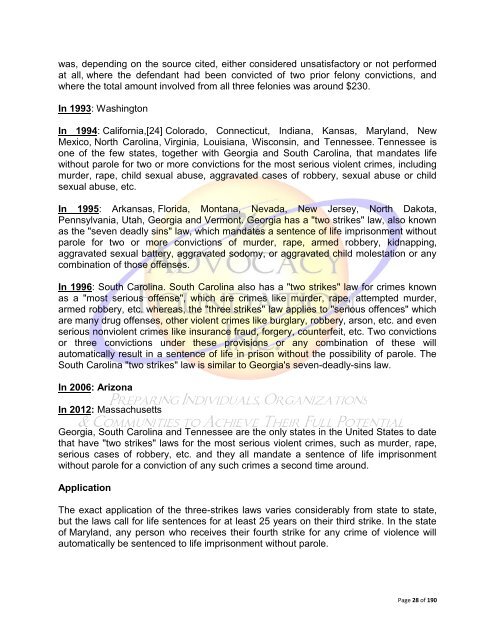The Violent Crime and Law Enforcement Act of 1994
The Violent Crime and Law Enforcement Act of 1994
The Violent Crime and Law Enforcement Act of 1994
You also want an ePaper? Increase the reach of your titles
YUMPU automatically turns print PDFs into web optimized ePapers that Google loves.
was, depending on the source cited, either considered unsatisfactory or not performed<br />
at all, where the defendant had been convicted <strong>of</strong> two prior felony convictions, <strong>and</strong><br />
where the total amount involved from all three felonies was around $230.<br />
In 1993: Washington<br />
In <strong>1994</strong>: California,[24] Colorado, Connecticut, Indiana, Kansas, Maryl<strong>and</strong>, New<br />
Mexico, North Carolina, Virginia, Louisiana, Wisconsin, <strong>and</strong> Tennessee. Tennessee is<br />
one <strong>of</strong> the few states, together with Georgia <strong>and</strong> South Carolina, that m<strong>and</strong>ates life<br />
without parole for two or more convictions for the most serious violent crimes, including<br />
murder, rape, child sexual abuse, aggravated cases <strong>of</strong> robbery, sexual abuse or child<br />
sexual abuse, etc.<br />
In 1995: Arkansas, Florida, Montana, Nevada, New Jersey, North Dakota,<br />
Pennsylvania, Utah, Georgia <strong>and</strong> Vermont. Georgia has a "two strikes" law, also known<br />
as the "seven deadly sins" law, which m<strong>and</strong>ates a sentence <strong>of</strong> life imprisonment without<br />
parole for two or more convictions <strong>of</strong> murder, rape, armed robbery, kidnapping,<br />
aggravated sexual battery, aggravated sodomy, or aggravated child molestation or any<br />
combination <strong>of</strong> those <strong>of</strong>fenses.<br />
In 1996: South Carolina. South Carolina also has a "two strikes" law for crimes known<br />
as a "most serious <strong>of</strong>fense", which are crimes like murder, rape, attempted murder,<br />
armed robbery, etc. whereas, the "three strikes" law applies to "serious <strong>of</strong>fences" which<br />
are many drug <strong>of</strong>fenses, other violent crimes like burglary, robbery, arson, etc. <strong>and</strong> even<br />
serious nonviolent crimes like insurance fraud, forgery, counterfeit, etc. Two convictions<br />
or three convictions under these provisions or any combination <strong>of</strong> these will<br />
automatically result in a sentence <strong>of</strong> life in prison without the possibility <strong>of</strong> parole. <strong>The</strong><br />
South Carolina "two strikes" law is similar to Georgia's seven-deadly-sins law.<br />
In 2006: Arizona<br />
In 2012: Massachusetts<br />
Georgia, South Carolina <strong>and</strong> Tennessee are the only states in the United States to date<br />
that have "two strikes" laws for the most serious violent crimes, such as murder, rape,<br />
serious cases <strong>of</strong> robbery, etc. <strong>and</strong> they all m<strong>and</strong>ate a sentence <strong>of</strong> life imprisonment<br />
without parole for a conviction <strong>of</strong> any such crimes a second time around.<br />
Application<br />
<strong>The</strong> exact application <strong>of</strong> the three-strikes laws varies considerably from state to state,<br />
but the laws call for life sentences for at least 25 years on their third strike. In the state<br />
<strong>of</strong> Maryl<strong>and</strong>, any person who receives their fourth strike for any crime <strong>of</strong> violence will<br />
automatically be sentenced to life imprisonment without parole.<br />
Page 28 <strong>of</strong> 190
















